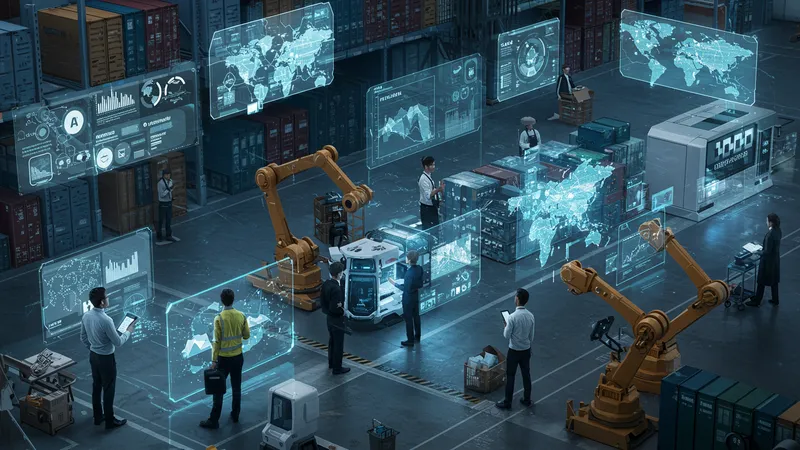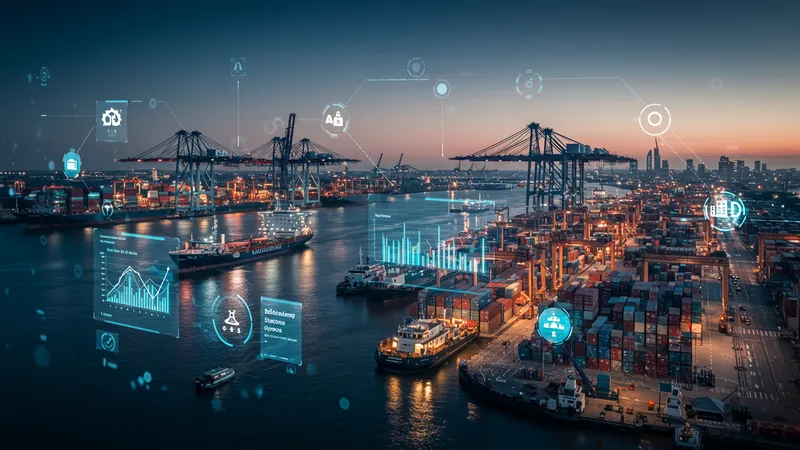

Global trade is undergoing a remarkable shift as artificial intelligence advances swiftly in its capabilities. Rather than simply automating individual logistical steps, AI now drives complex decision-making, real-time data analysis, and seamless international coordination. At its core, AI-driven growth and efficiency in global trade means leveraging algorithms, machine learning, and predictive analytics to streamline every layer of the import and export ecosystem—reducing delays, improving cost management, and opening new market pathways for freight, trade finance, and beyond. The focus today is not just on operational speed but on using intelligent technology to create new value and establish more resilient supply chains.
In this context, global trade participants—manufacturers, logistics providers, shipping companies, and customs authorities—are actively integrating AI solutions into their daily operations. This breakthrough goes beyond “robotizing” shipments: it carefully interprets live trade flows, adapts pricing strategies, and mitigates disruption risks on an international scale. Digital platforms, predictive demand models, and AI-powered compliance checks are transforming how goods reach consumers across borders. For the United Kingdom, these shifts matter more than ever as the nation seeks competitive trade advantages, especially post-Brexit, amid changing international partnerships.

Tradeshift’s AI-powered engine allows British companies to automate invoice processing and manage global transactions across varied currencies and regulations. For enterprises wrestling with fragmented paperwork, this platform makes compliance both faster and more accurate, slashing manual efforts and reducing costly human errors.
Flexport is a popular solution among UK importers seeking a digital-first approach to shipping. Its AI modules factor in real-time port congestion, customs changes, and transport disruptions, proposing agile route alternatives. Users benefit from faster turnarounds and high visibility, which is essential for perishable or high-value goods entering or leaving the UK market.
ClearMetal distinguishes itself by enabling predictive logistics—it taps into customs data, weather forecasts, and demand projections to help British retailers avoid stock-outs or overstocks. By optimizing inventory levels and recommending shipping schedules, the tool supports sustainable trade operations, a growing priority for UK businesses under strict carbon guidelines.
Collectively, these AI tools exemplify how the United Kingdom actively adopts artificial intelligence to drive exports and imports. The measurable results: improved shipment reliability, optimized costs, and heightened adaptability to global trade policy shifts. As AI grows even more proficient, its impact on trade structures is set only to deepen.
While these examples just scratch the surface, the underlying transformation of the UK’s global trading systems runs much deeper. The next sections explore the mechanisms, practical outcomes, and future outlooks tied specifically to AI-driven growth and efficiency in global trade for the United Kingdom. The deeper details reveal even more valuable insights ahead…
The integration of artificial intelligence into UK trade operations has altered traditional industry dynamics. No longer limited by manual data entry and fragmented paperwork, companies across the nation are experiencing streamlined customs clearance, automated compliance checks, and smoother intercontinental communication. This acceleration not only saves time but directly supports expansion by letting British exporters and importers respond instantly to market shifts and emerging logistics bottlenecks.

Government initiatives in the United Kingdom are rapidly encouraging AI adoption across the entire trade value chain. The UK Government’s Digital Trade Strategy specifically highlights investment in digital borders and customs modernization, with AI as a pivotal enabler. Platforms like Tradeshift and Flexport, endorsed by HM Revenue & Customs, have achieved integration with e-customs systems, facilitating rapid and accurate transaction validation.
Comparatively, nations that lag in AI deployment see increased delays and higher costs due to redundant manual interventions. For UK logistics firms, the measurable efficiency gains—sometimes up to 40% faster shipment processing times—are giving British goods an edge in competitive markets, particularly in Europe, Asia, and North America post-Brexit.
Furthermore, as the UK economy pivots towards high-value, time-sensitive exports (such as pharmaceuticals and tech equipment), AI’s predictive logistics capabilities become indispensable. With market volatility and regulatory uncertainty on the rise, British trade leaders are discovering that automation and AI-driven optimization make their supply chains not just faster, but demonstrably more resilient. The real test lies in scaling these gains across all business sizes.
AI-enabled data platforms allow UK companies to analyze thousands of variables—shipping routes, port delays, weather patterns, and currency shifts—simultaneously. Rather than relying on historical averages or intuition, British trade managers now base crucial shipment and sourcing decisions on real-time, predictive insights. This shift is key to reducing waste, lowering freight expenditures, and improving customer satisfaction for UK-based clients.

Flexport employs machine learning algorithms to map the fastest and most risk-resilient ocean or air routes for British businesses, factoring in Brexit-related customs changes. The platform’s continuous learning capability means it self-improves with each new shipment, dynamically updating recommendations and adapting to global disruptions—notably, helping UK firms navigate the Suez Canal blockage in 2021 with minimal delay.
Inventory optimization, as powered by ClearMetal, has proven particularly impactful for the UK’s robust e-commerce and retail sectors. Predictive analytics help companies anticipate inventory fluctuations during seasonal events such as Black Friday or Christmas, empowering them to avoid overstock penalties and preserve working capital. The end result is a more agile response to demand uncertainties both domestically and abroad.
Tradeshift’s AI tools further enhance these outcomes by identifying erroneous invoices, duplicated payments, and compliance gaps before they escalate. For large British corporations handling thousands of invoices monthly, the result is significant savings and a stronger financial foundation for investment in further growth. Together, these AI-driven platforms constitute a digital nervous system for the UK’s modernized trade infrastructure.
British exporters are now using AI-enhanced platforms to manage rising volatility in global tariffs, sanctions, and transport costs. Flexport, for instance, tracks regulatory updates across the EU and rest of the world, helping UK businesses avoid costly delays or errors. As a result, exporters can pivot strategies rapidly—choosing alternative ports, re-routing cargo, or adjusting pricing when global events threaten supply chain stability. This flexibility is invaluable in markets shaped by post-Brexit regulations.

For importers, tools like Tradeshift and ClearMetal streamline customs clearance at the UK’s busiest entry points—Heathrow, Felixstowe, and Dover. Automated document processing reduces clearance times and improves accuracy, reducing the risk of non-compliance penalties. Small and mid-sized UK businesses especially benefit, gaining access to digital resources once reserved for global conglomerates.
On the policy front, the UK government’s trial of AI-driven customs inspections is already demonstrating reduced wait times and lower incident rates at border crossings. By catching anomalies or documentation errors before physical inspections occur, AI is fundamentally improving the efficiency and integrity of British trade flows. As these trials expand, trade participants expect further reductions in cost and administrative overhead.
These advancements are not merely about speed; they generate new data-driven insights to inform strategic planning. UK manufacturers and logistics providers can now simulate trade routes and inventory models before making substantial investments, reducing risk and boosting long-term competitiveness on the international stage.
As AI integrations mature, scalability becomes the new frontier. For the United Kingdom, the focus is on ensuring that not only large enterprises but also small and medium-sized firms reap the benefits of intelligent automation. Industry consortia, such as the UK’s Tech Nation, are now partnering with AI solution providers to develop affordable, tailored tools for SMEs involved in cross-border trade. These collaborations are yielding solutions that address specific regional and regulatory complexities unique to the UK market.

Transparency and ethical considerations are equally crucial. The UK’s Data Ethics Framework and forthcoming digital trade standards mandate that AI-driven systems be transparent, secure, and accountable. This approach aligns with EU and global partners, sustaining trust among international buyers and suppliers—an essential ingredient for the UK’s ambitions as a trade powerhouse.
The measurable impact is already visible: according to the UK Department for International Trade, companies adopting AI-powered trade solutions report faster market entry and a reduction in supply chain disruptions by up to 30%. These results have not gone unnoticed by trading partners, who increasingly see UK firms as reliable, tech-forward collaborators in the increasingly digitalized global marketplace.
Looking ahead, as AI continues to evolve, British trade participants face both fresh challenges and unprecedented growth prospects. Advanced technologies like digital twins, autonomous shipping, and natural language customs processing hold the promise to further refine and accelerate the UK’s commercial relationships worldwide. The ongoing transformation signals not only improved efficiency but a truly intelligent, adaptive approach to cross-border trade in the United Kingdom.